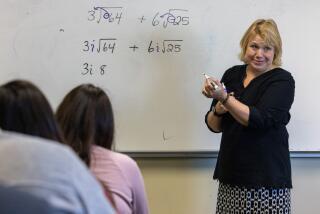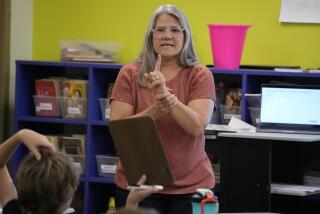Letters: Turning kids onto math isn’t so simple
- Share via
Re “The masterpieces of math,” Opinion, March 2
As a high school math teacher, I appreciate UC Berkeley professor Edward Frenkel’s enthusiasm for the abstractness and applications of math in the real world. I love projects on fractals, snowflake symmetry, logic and reasoning in advertising and more. I would do more if I had time — but I don’t have time.
High-school curriculum is held hostage to tests that measure those 1,000-year-old formulas and applications as a means to get into colleges. Yes, the very college where Frenkel teaches would not be attainable by students if all they studied were abstract applications of math, since none of those topics are on the SAT, ACT or even the AP Calculus exams.
Frenkel mentions that if we teachers were to devote 20% of our time to those types of math topics, students would be more interested in studying math because they would see the connectedness of it all in their world. Great idea. Problem is, I have already thrown out many useful and interesting topics to accommodate all those “essential” ideas that show up on standardized tests.
Get rid of those tests and find a more holistic way to admit students to college. Let them enjoy learning rather than worry about grades and courses that affect their college admissions.
Julie Whittell
Los Angeles
Student math proficiency in the United States is very weak compared with that in many other nations. We simply are not attracting the great mathematicians like Frenkel into the classroom. Those who are experts in math usually go into professions more lucrative than teaching.
The security of the United States depends on turning this crisis around. The key is to greatly increase salaries for genuine math experts in the classroom; these people must also be trained in exhibiting a love of math, as Frenkel so nicely explains. It is crucial for us to eliminate the fear of math that has permeated our society over the last century, making us a Third World nation of math-phobes.
We need giant federal subsidies to attract the best of the best, just as this country did for science after the launch of Sputnik in 1957. Boosting math proficiency is indeed a high-priority national security issue.
Steven B. Oppenheimer
Northridge
The writer, a professor of biology at Cal State Northridge, received a U.S. Presidential Award for excellence in science, math and engineering mentoring in 2010.
It is completely wrong to imply that Euclidean geometry is somehow not interesting because it is old. Actually, Euclidean geometry appeals not only in its intrinsic mathematical nature but also in its power to explain what one sees around one spatially.
If this subject is taught badly, like any other subject it can seem tedious. If it is taught well, it arouses the sense of the intellectual power and attractiveness of mathematical thought as well as or better than anything else that can be presented to a beginner.
One of the points of mathematics educationally is to introduce students to a subject in which precise thought exists. They are surrounded by a world of baloney versions of science. Mathematics is where they find out that really precise thought exists. The last thing they need is to be given the impression that mathematics is another subject in which learning a few buzzwords is the whole show.
Modern mathematics can exist only because older mathematics has existed.
Robert E. Greene
Pacific Palisades
The writer is a professor of mathematics at UCLA.
ALSO:
Letters: Malpractice cap needs a raise
Letters: Other views on how we see Cuba
Letters: Blocking a qualified Obama nominee
More to Read
A cure for the common opinion
Get thought-provoking perspectives with our weekly newsletter.
You may occasionally receive promotional content from the Los Angeles Times.






